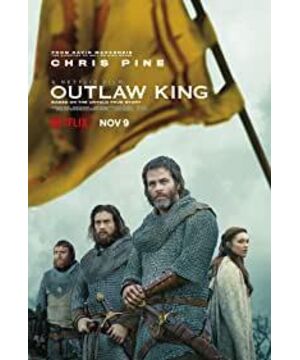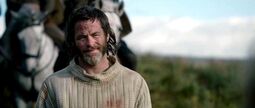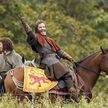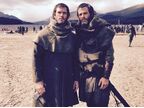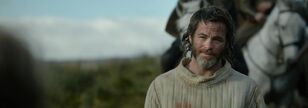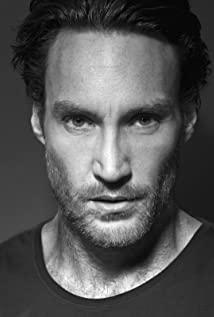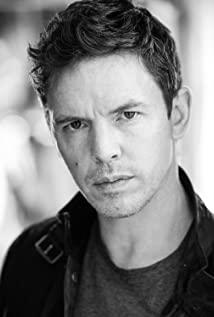This film should be watched with "Brave Heart". Some people say that this is a sequel to "Brave Heart", which is not an exaggeration. It tells two stories in the same region during the same period. It's just that in "Brave Heart", there are more interpretations, including that heart is also not the other. The "King Outside the Law" is a narrative of history.
Britain in 1304. Several nobles in Scotland competed for the title of king. Unexpectedly, King Edward I of England had long coveted here, and took advantage of their trouble-making skills to occupy Scotland. This annoyed the Scottish nobleman Robert Bruce. He relied on himself as a king with the heroic spirit of "the prince and general Xiangning has a kind". Lead the Scottish people to win more with less and defeat the British army many times. Finally, Scotland gained independence and established its own country. Robert Bruce is also respected by the people of Scotland as a national hero.
The film describes the history of Bruce leading the Scottish people against the British army. In the early days of his army, he was weak, and not many people were optimistic about him. When the British army encountered repeated defeats, his wife also asked the British army to arrest him. After the defeat, he took the remaining forty people and fled to a small island to live on, slowly gathering strength. It is said that at this time, he saw a spider forming a web in the wind and rain. Although he failed repeatedly and did not give up, he finally succeeded. So inspired and determined to make a comeback. Only then has the victory later.
The biggest difference between a great man and an ordinary man is that the former has foresight and firm conviction, while the latter is only a short-sighted pursuit of gains and losses. When things go well, everyone knows how to take advantage of the trend to achieve their goals. In times of adversity, it is the biggest test for a great man. Such as Churchill in the early days of World War II, such as Li Zicheng when he left Tongguan, such as Mao Zedong during the Long March of the Red Army, such as Robert Bruce in this film. Their final victory came from the tempering they got in adversity, from the "persistent efforts." The Bruce portrayed in the film is such a persevering leader. Leading a gang of mobs to use guerrilla warfare, harass the British army today and seize a castle tomorrow. After more than ten years of fighting, it was not until the victory of Bannockburn that the British army gave up.
Let's talk about justice. Throughout the history of the British Isles, there are mostly wars between invaders and aboriginal tribes, Roman invasions, Germanic invasions, and Danish invasions. While these constant invasions are accompanied by killing and plunder, they also promote the assimilation and civilization of the nation. progress. Not only Britain, the whole of Europe in the Middle Ages was almost full of barbarism and slaughter. The state form is only to resist foreign invasion, and the need for the integration of various tribes is slowly gradually formed. This state form is only a rough and vague thing. When people interact with each other, they still see ethnic groups such as Gauls and Germans, rather than countries. Maybe you are French today, you will be German tomorrow, you will be Ukrainian today, and you will be Polish tomorrow. Therefore, in the consciousness of Europeans, the identity of the nation is far stronger than the identity of the country. If the kind of expansion in the early stage of civilization development is a law, then the criterion for judging its justice is whether this kind of expansion is recognized by the people. For Britain, even if you are powerful, no matter what means you use, you cannot deprive any nation of freedom. The key to Robert Bruce's victory over the mighty England is that he has the support and approval of the entire Scottish nation. Although the independence he finally won was short-lived, after nearly a thousand years, this kind of inter-ethnic strife is still showing tenaciously everywhere. As William Wallace said: "You can take our lives, but you can never take our freedom."
The film faithfully describes that period of history. Dramatic scenes rarely fabricated. However, after I watched the movie, I faced the question: How do you evaluate the character Robert Bruce? I see it this way: He is a national hero of Scotland, a great man. Not a noble person. While leading the people to fight against Britain, he also had many unbearable performances. For example, he once swore allegiance to the King of England. He was a political enemy in his former church. According to historical data, the murder of William Wallace, an anti-British righteous, was also related to him. In the film, when Douglas came to join him, he asked him: "Are you a good person?" Bruce replied: "I try to be a good person." It seems that Bruce himself is not sure whether he is good or bad. Everyone has two sides. When a celebrity presents his achievements to the public, he usually conceals his other side subconsciously. A politician or politician, in the process of working hard for his faith, morality is often the price he has to pay. Distrust, betrayal, shamelessness, and licentiousness are everywhere, ancient and modern. If Trump has truly achieved his "America First" feat, will people forget the scandal of him having sex with a female model? Even if he has paid off the prostitution in full. There are many similar examples, such as Bacon and Chen Duxiu.
The most outstanding part of the film, I feel that it is the shooting of the scenery. The rolling hills of the Scottish Highlands, slender winding roads, towering castles. very beautiful! The scenes of the war were also very well filmed. The fighting with cold weapons was more intense and cruel than modern warfare. The real corpses flowed into rivers all over the wild. After the battle in the swamp, people's faces were covered with blood and mud. Very real.
My score: 7.0.
View more about Outlaw King reviews


